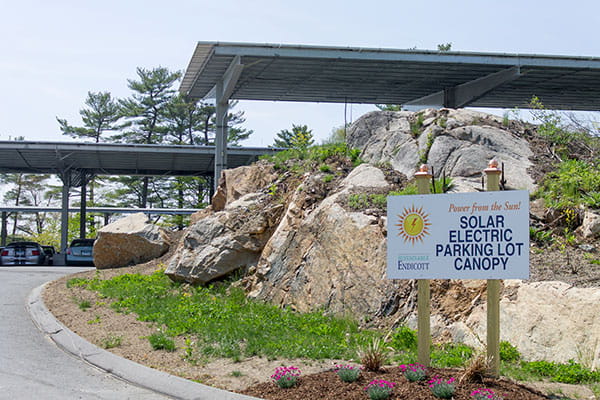As global natural gas prices continue to rise and climate change effects increase, Endicott College’s ongoing dedication to environmental stewardship has been recognized once again by The Princeton Review.
In its Guide to Green Colleges: 2023 Edition, Endicott is listed among a selection of colleges recognized for not only having environmentally-friendly campuses but also preparing students for employment in an increasingly green economy.
At the forefront of Endicott’s recent sustainable accomplishments is the opening of a third solar installation atop the main parking garage roof. Built in partnership with PowerOptions, an energy procurement and management nonprofit, the roof helps power the Samuel C. Wax Academic Center and Hempstead Commons with an average of 345,000 kWh annually, or approximately 30% of these buildings’ electricity needs. Combined with the existing solar on campus, solar power provides about 13% of the College’s overall electricity usage.

With the loss of Russian natural gas due to political upheaval, Europe will be importing more of the resource from the U.S., driving domestic prices up. In New England alone, 53% of electricity is generated through gas, but Endicott’s solar panels allow the College to lock in energy prices for a multi-year period, which will help insulate it from geopolitical fluctuations this year and up to 20 years in the future.
“We now have seven buildings on campus that are getting a good portion of their power from renewable energy sources,” said Associate Director of Sustainability Carly Thibodeau. “We are constantly seeking opportunities to expand solar on campus—assessing which rooftops would be good candidates for solar based on size, roof age, and building energy needs.”
Thibodeau said that now is an exceedingly opportune time to consider solar because of the Inflation Reduction Act, a recent piece of federal legislation making solar power more financially viable. She also noted that Endicott’s solar efforts are significant for a small- to medium-sized institution.
“Our land area is pretty small compared to other universities with similar student populations,” she said. “Those schools have a lot more land to support solar panels. At Endicott, we’re looking at innovative ways to incorporate solar in places like on top of the Raymond J. Bourque Arena and parking structure to help strengthen our renewable portfolio.”
Endicott’s location as a coastal school has long influenced a dedication to sustainability, including reducing waste and conserving water and energy.
“When it was installed in 2014, our solar lot canopy was the largest in the Northeast,” explained Thibodeau. “On the coast, we can see impacts of climate change right here, such as damages to our seawall or flooding in some areas of campus, so we’re cognizant of everything we can do to reduce our impact, improve our footprint, and make smart financial decisions with renewable energy.”

Along with the Campus Sustainability Committee and other Office of Sustainability staff, Thibodeau is working on a campus-wide Sustainability Plan to coordinate the College’s medium- and long-term efforts.
Outside of solar, notable sustainability campus initiatives include:
- Saving over 988,000 kWh of energy with efficiency programs like lighting retrofits, efficient building design, and retro-commissioning since 2019
- Implementing gas efficiency projects like heating and cooling updates and low flow water fixtures, with an annual therm savings of 31,433, or the equivalent of 282 Mass. homes, since 2019
- Residence hall waste and recycling programs
- The addition of specialty recycling streams (plastic film and masks)
- Office composting pilot program
- Increasing staff participation in sustainability through programs like the Freecycle Table in the Halle Library
- Participation in Demand Response events, where the College curtails energy in its four highest energy-using buildings during peak grid demand events like extreme heat advisories
- Launching a feasibility study on electrifying fuel oil buildings to raise the efficiency of heating and cooling while reducing dependency on fossil fuels
For a detailed look, check out the map of sustainable resources on campus that was recently released by the Office of Sustainability, which includes everything from recycling and composting locations to water bottle refill stations and more.
Thibodeau also explained that Endicott’s inclusion in the Green Colleges list provides the College with exemplary models to improve our own sustainability operations.
“To be compared to top green schools globally this year and in years past, shows that we are doing the right things, and have been doing so for a long time,” she said. “It also really lets us learn from other schools, build connections, and figure out how we can improve based on the benchmarks of other highly successful programs.”


